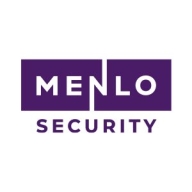


Menlo Secure and Check Point CloudGuard Network Security are leading products in the cybersecurity market. Users generally favor Check Point CloudGuard Network Security for its features and ease of use, whereas Menlo Secure stands out for its competitive pricing and strong customer support.
Features: Menlo Secure is valued for its isolation capabilities, real-time protection, and ease of deployment. Check Point CloudGuard Network Security is praised for its comprehensive threat prevention, scalability, and robustness.
Room for Improvement: Menlo Secure needs to enhance its reporting functions, integrate better with other platforms, and improve its user interface. Check Point CloudGuard Network Security could simplify its configuration process, enhance its documentation, and streamline updates.
Ease of Deployment and Customer Service: Menlo Secure is easier to deploy and offers efficient customer support. Check Point CloudGuard Network Security offers extensive deployment options but has a steeper learning curve and slower support response times.
Pricing and ROI: Menlo Secure is preferred for its cost-effectiveness and faster ROI. Check Point CloudGuard Network Security is more expensive but is considered worth the investment due to its superior feature set and long-term benefits.
| Product | Market Share (%) |
|---|---|
| Fortinet FortiGate | 20.4% |
| Check Point CloudGuard Network Security | 0.7% |
| Menlo Secure | 0.1% |
| Other | 78.8% |



| Company Size | Count |
|---|---|
| Small Business | 350 |
| Midsize Enterprise | 130 |
| Large Enterprise | 187 |
| Company Size | Count |
|---|---|
| Small Business | 59 |
| Midsize Enterprise | 38 |
| Large Enterprise | 75 |
Fortinet FortiGate excels in providing integrated VPN, firewalling, and Unified Threat Management (UTM) with centralized management and high availability. It supports remote access and comprehensive threat protection, making it a preferred choice for securing networks.
Fortinet FortiGate offers a robust security platform with features such as strong intrusion prevention, application control, and web filtering. Its integration with Active Directory and SD-WAN functionality provides scalable solutions for large networks. Users appreciate its ease of use through centralized management interfaces, ensuring robust security with flexible configurations. However, FortiGate could enhance its graphical interface and technical support responsiveness, address firmware bugs and costly licensing, improve logging, integrate better with third-party tools, and strengthen scalability and memory for log storage. Complexity in configuration and the need for intuitive features are noted challenges, and there's a demand for advanced security, zero-trust capabilities, and AI integration.
What are the key features of Fortinet FortiGate?Fortinet FortiGate is widely implemented across industries like education, finance, and government. Companies use it for firewall protection, VPN, and SD-WAN capabilities, ensuring secure perimeter and data center security. It facilitates remote access management and traffic routing optimization, offering reliable security and connectivity solutions.
Check Point CloudGuard Network Security offers centralized management, robust threat prevention, and seamless integration with major public clouds, ensuring consistent security for cloud and on-premises environments. It combines ease of use with flexibility across diverse IT infrastructure.
Check Point CloudGuard Network Security provides comprehensive protection for IT infrastructures in AWS, Azure, and hybrid environments. It ensures firewall security, managing traffic and securing cloud infrastructures while maintaining network protection and compliance enforcement. Organizations benefit from its centralized security governance, enhanced visibility, and threat prevention for both perimeter and internal security. It offers seamless integration with leading cloud platforms, allowing for efficient deployment and scalability, aligning with modern cloud requirements.
What are the key features of Check Point CloudGuard Network Security?In industries such as finance, healthcare, and tech, Check Point CloudGuard Network Security is vital for protecting sensitive data, managing compliance, and safeguarding daily operations. Its robust integration capabilities support diverse infrastructure setups, assisting companies in maintaining high-security standards efficiently.
Menlo Security Secure Application Access
Menlo Security Secure Application Access makes zero trust access easy, giving users secure connectivity to private applications, including web and legacy applications. At the core of Secure Application Access is the Menlo Secure Cloud Browser, which fetches, secures and delivers the content for users.
In addition to providing simple-to-deploy, clientless ZTA, Secure Application Access and the Menlo Secure Cloud Browser protect applications from attacks such as session hijacking, cookie manipulation, and other tactics that employ protocol manipulation.
Secure Application Access protects applications from Internet threats and provides granular controls for added protection of the application and associated data. These security controls include Read-only/Read-write, Upload/download, Copy/paste, AV scanning, Sandboxing, and Data Loss Prevention.
Last Mile Data Protection
Menlo Last-Mile Data Protection identifies and prevents sensitive data from leaving your company by meticulously inspecting all file uploads and user input across browsing sessions. Leveraging the Secure Cloud Browser, users are protected from the internet and you can protect your organization from data loss with comprehensive traffic monitoring and controls. This approach addresses the growing concerns surrounding data leakage in the age of AI tools like ChatGPT.
By identifying sensitive data through file types, regular expressions, or predefined libraries, Menlo Last-Mile Data Protection empowers security teams to regulate data input into AI platforms and prevent unauthorized uploads. This capability provides crucial protection for intellectual property, PII, and other confidential information.
The solution leverages the Menlo Cloud Security Platform's visibility and control over traffic to reliably detect and prevent data leaks originating from both browser submission forms and non-browser traffic. With the ability to inspect encrypted web traffic, Menlo Last-Mile Data Protection enforces DLP policies consistently across all users and devices, ensuring comprehensive data protection.
We monitor all Firewalls reviews to prevent fraudulent reviews and keep review quality high. We do not post reviews by company employees or direct competitors. We validate each review for authenticity via cross-reference with LinkedIn, and personal follow-up with the reviewer when necessary.